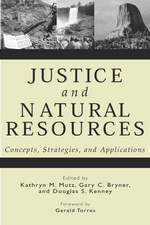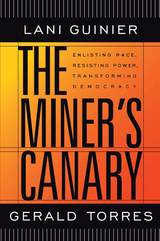
Just over two decades ago, research findings that environmentally hazardous facilities were more likely to be sited near poor and minority communities gave rise to the environmental justice movement. Yet inequitable distribution of the burdens of industrial facilities and pollution is only half of the problem; poor and minority communities are often denied the benefits of natural resources and can suffer disproportionate harm from decisions about their management and use.
Justice and Natural Resources is the first book devoted to exploring the concept of environmental justice in the realm of natural resources. Contributors consider how decisions about the management and use of natural resources can exacerbate social injustice and the problems of disadvantaged communities. Looking at issues that are predominantly rural and western -- many of them involving Indian reservations, public lands, and resource development activities -- it offers a new and more expansive view of environmental justice.
The book begins by delineating the key conceptual dimensions of environmental justice in the natural resource arena. Following the conceptual chapters are contributions that examine the application of environmental justice in natural resource decision-making. Chapters examine:
- how natural resource management can affect a range of stakeholders quite differently, distributing benefits to some and burdens to others
- the potential for using civil rights laws to address damage to natural and cultural resources
- the unique status of Native American environmental justice claims
- parallels between domestic and international environmental justice
- how authority under existing environmental law can be used by Federal regulators and communities to address a broad spectrum of environmental justice concerns

Like the canaries that alerted miners to a poisonous atmosphere, issues of race point to underlying problems in society that ultimately affect everyone, not just minorities. Addressing these issues is essential. Ignoring racial differences--race blindness--has failed. Focusing on individual achievement has diverted us from tackling pervasive inequalities. Now, in a powerful and challenging book, Lani Guinier and Gerald Torres propose a radical new way to confront race in the twenty-first century.
Given the complex relationship between race and power in America, engaging race means engaging standard winner-take-all hierarchies of power as well. Terming their concept "political race," Guinier and Torres call for the building of grass-roots, cross-racial coalitions to remake those structures of power by fostering public participation in politics and reforming the process of democracy. Their illuminating and moving stories of political race in action include the coalition of Hispanic and black leaders who devised the Texas Ten Percent Plan to establish equitable state college admissions criteria, and the struggle of black workers in North Carolina for fair working conditions that drew on the strength and won the support of the entire local community.
The aim of political race is not merely to remedy racial injustices, but to create truly participatory democracy, where people of all races feel empowered to effect changes that will improve conditions for everyone. In a book that is ultimately not only aspirational but inspirational, Guinier and Torres envision a social justice movement that could transform the nature of democracy in America.
READERS
Browse our collection.
PUBLISHERS
See BiblioVault's publisher services.
STUDENT SERVICES
Files for college accessibility offices.
UChicago Accessibility Resources
home | accessibility | search | about | contact us
BiblioVault ® 2001 - 2024
The University of Chicago Press









